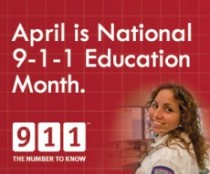When should I call 9-1-1?
You should call 9-1-1 any time you believe an ambulance, fire department, or law enforcement needs to respond immediately to a situation. If you are unsure whether you should call 9-1-1 to report something, dial 9-1-1 and speak with one of our trained telecommunicators who can help in determining what type of assistance to send.
What number should I call for non-emergency assistance?
Please dial (920) 391-7450 for all non-emergency calls in Brown County. A telecommunicator will help provide the assistance you need.
What should I know when calling 9-1-1?
The most important information to provide the 9-1-1 telecommunicator is your location. Also, be prepared to state what service you require – Police, Fire or Ambulance and your name and phone number. While travelling, always be aware of your location. It is also helpful to know what jurisdiction you are in (the City of Green Bay, Village of Allouez, Town of Denmark, etc.). Please download our “911 – What to Know About Making the Call” brochure for further information.
How can I help the 9-1-1 telecommunicator?
- Remain on the line after you dial. It may take a few rings to connect you with the 9-1-1 Center.
- Stay calm, speak clearly and remain on the line until the telecommunicator instructs you to hang up.
- Be prepared to answer questions. Telecommunicators are trained to ask specific questions to aid the responders or to give you medical instructions.
- If you cannot speak after dialing 9-1-1, make some sort of noise so the telecommunicator is aware you are there and require assistance. You can bang the phone against something hard so they hear it, but do not press buttons until instructed to do so. Many telecommunicators will say, “If this is an emergency, press a button.”
- If you accidentally dial 9-1-1, do not hang up. Remain on the line and give the telecommunicator the information they require.
Why does the 9-1-1 telecommunicator ask so many questions?
The telecommunicator answers a 9-1-1 call with the question, “Brown County 9-1-1, where is your emergency?” This is the most critical piece of information we can gather. Other questions are asked as appropriate or as dictated by Emergency Medical Protocols. All questions asked by the telecommunicator are vital to gather the most appropriate information in the shortest amount of time. During emergency situations, help is usually on the way while the telecommunicator continues to gather further information from you.
What should I do if I dial 9-1-1 by mistake?
Do not hang up! Remain on the line (even if you are unsure at first the call went through) and answer the telecommunicator’s questions.
When calling from my cell phone, does the 9-1-1 Center automatically know my location?
Cell phones do not always provide the 9-1-1 telecommunicator an exact (and sometimes, not even a general) location, no matter how expensive or technologically advanced. There are several scenarios possible when calling 9-1-1 from your cell phone:
- The 9-1-1 call is received by the proper Public Safety Answering Point (PSAP), also known as a 9-1-1 Center. Information provided includes the name of the wireless company sending the call to 9-1-1 (such as US Cellular, Sprint, etc.) and the location, including which side, of the antenna handling your call. We also receive the phone number of the handset making the call to 9-1-1 and a GPS location, which can be accurate from approximately 30 feet to one mile or more from where the cell phone is located. This is the best scenario, but even in this case the GPS coordinate we receive may not provide your exact location.
- The 9-1-1 call is received by the proper PSAP. Information provided includes all information listed in scenario #1 except for the GPS location.
- The call is received by the proper PSAP, but limited or no further information is received with the phone call (i.e., no GPS, antenna location, cell phone carrier, phone number, etc.).
- The call is routed to the wrong PSAP, which would cause delays in routing your emergency call to the proper location. This scenario can occur when the closest cell tower to you is located in another county. Therefore, it is important to know which county you are calling from.
Cellular 9-1-1 is not as reliable as traditional home phone service. Do not assume the telecommunicator knows who you are and where you are calling from when dialing 9-1-1 with your mobile device.
When calling from my VoIP phone, does the 9-1-1 Center know my location?
Voice over Internet Protocol (VoIP), also called Internet, digital, broadband or cable phone service is a rapidly growing alternative to traditional phone service. Its popularity is fueled primarily by low prices, new features and the consumer’s ability to choose a phone number from nearly anywhere in the country (and sometimes, other countries). VoIP may look and appear to work like a traditional phone but it connects to the Internet, not a telephone line. While VoIP is an attractive option, it is important for consumers to understand the potential limitations the technology has with respect to accessing 9-1-1 in an emergency.
- There is no way for the 9-1-1 Center to know the location of your VoIP phone unless your current location is properly registered with your service provider and the service provider properly supports 9-1-1 features. Check with your service provider for emergency calling features.
- When calling 9-1-1, provide your location and call back number.
- Call back if you are disconnected.
- If the power is out, you may not have VoIP service. Consider purchasing a back-up power supply.
- If you travel with your VoIP adapter, your call may not reach the correct 9-1-1 center.
- Be sure to keep your registered location current with your VoIP provider.
- Inform children, babysitters, and visitors about your VoIP service.
- Post your address and call-back phone number near your phone.
- Consider keeping a landline phone for accessing 9-1-1 emergency services.
Is it possible to send a text message to 9-1-1?
Yes. Texting to 9-1-1 will work. However, sending video to 9-1-1 will not.
I have additional questions. Who can I contact?
If you are unable to find the information you are looking for or require further information, please use our contacts page to submit a question or comment.


 The Brown County Public Safety Communications department is located in Green Bay, WI. Brown County PSC provides 9-1-1 service to all Brown County residents and visitors.
The Brown County Public Safety Communications department is located in Green Bay, WI. Brown County PSC provides 9-1-1 service to all Brown County residents and visitors. 


